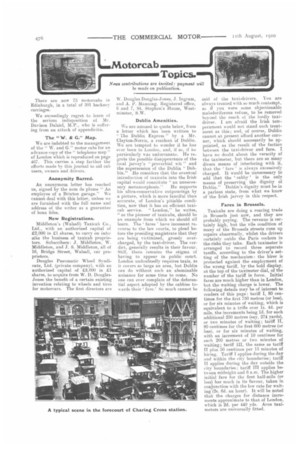There are now 7.5 motorcabs in Edinburgh, in a total of 591 hackney carriages.
Page 14

If you've noticed an error in this article please click here to report it so we can fix it.
We exceedingly regret to learn of the serious indisposition of Mr. Davison Dalziel, M.P., who is suffering from an attack of appendicitis.
The " Si G. Map.
We are indebted to the management of the " W. and G." motor cabs for an advance copy of the " telephone map " of London which is reproduced on page 467. This carries a step farther the efforts made by this journal to aid cab users, owners and drivers.
Anonymity Barred.
An anonymous letter has reached us, signed by the nom de plume "An employee of a Brixton garage." We cannot deal with this letter, unless we are furnished with the full name and address of the writer as a guarantee of bona fides.
New Registrations.
Middleton's (Walsall) Taxicab Co., Ltd., with an authorized capital of £2,000 in £1 shares, to carry on inter &jet the business of taxicab proprietors. Subscribers: J. Middleton, W. Middleton, and J. S. Middleton, all of 16, Bridge Street, Walsall, car proprietors.
Douglas Pneumatic Wheel Syndicate, Ltd. (private company), with an authorized capital of £3,000 in El shares, to acquire from W. D. DouglasJones the benefit of a certain existing invention relating to wheels and tires for motorcars. The first directors are W. Douglas Douglas-Jones, J. Ingram, and A. 11. Manning. Registered office, 6 and 7, St. Stephen's House, Westminster, S.W.
Dublin Amenities.
We are amused to quote below, from a letter which has been written to
The Dublin Express " by a Mr. Clayton-Norris, a resident of Dublin. We are tempted to wonder if he has ever been to London, and, if so, if ii particularly was unfortunate. He regrets the possible disappearance of the local jarvey's " proverbial wit " and the supersession of the Dublin " Dobbin." He considers that the eventual introduction of taxicabs into the Irish capital would constitute an unneces sary metamorphosis." He supports his ultra-conservative outpourings by a picture, which is more fanciful than accurate, of London's pitiable condition, now that it has an efficient taxicab service. " London," he writes, "as the pioneer of taxicabs, should be an example from which we should all learn. The 'fares ' have incessant recourse to the law courts, to plead before the presiding magistrate that they are being victimized, grossly overcharged, by the taxi-driver. The verdict, generally results in their favour. Still, there remains the stigma of having to appear in public court. London undoubtedly requires taxis, as it covers so large an area, but Dublin can do without such an abominable nuisance for some time to come. No one can ever complain of the deferential aspect adopted by the cabbies towards their fare.' So much cannot be
said of the taxi-drivers. Vuu are always treated with so much contempt, a if you were some objectionable malodoriferous refuse, to be removed beyond the reach of the lordly taxidriver. I am afraid the Irish temperament would not stand such treatment as this; and, of course, Dublin cannot at present afford another coroner, which should necessarily be appointed, as the result of the faction between the taxi-driver and fare. I have no doubt about the veracity of the taximeter, but there are so many divers means of interfering with it, that the fare ' is always excessively charged. It would be unnecessary to add that the ' cabby ' is the only means of preserving the dignity of Dublin." Dublin's dignity must be in a parlous state, from what we know of the Irish jarvey in this respect.
Fares in Brussels.
Taxicabs are doing a roaring trade in Brussels just now, and they are probably paying. The revenue is certainly high, but the vile condition of many of the Brussels streets runs up repairs abnormally, whilst the drivers certainly outdo the Paris cochers in the risks they take. Each taximeter is arranged to record three separate tariffs, according to the driver's setting of the mechanism : the hirer is protected against the employment of the wrong tariff, by the bold display, at the top of the taximeter dial, of the number of the tariff in force. Initial fares are much higher than in London, but the waiting charge is lower. The following details may be of interest to readers of this page : tariff I, 80 centimes for the first 750 metres (or less), or for six minutes of waiting, which is equivalent to a trifle over is. 4d. per mile, the increments being id, for each additional 250 metres (say, 274 yards), or two minutes of waiting ; tariff II, 80 centimes for the first 600 metres (or less), or for six minutes of waiting, with an increment of 10 centimes for each 200 metres or two minutes of waiting; tariff III, the same as tariff II plus 50 centimes per 15 minutes of hiring. Tariff I applies during the day and within the city boundaries; tariff H applies during the day outside the city boundaries ; tariff III applies between midnight and 6 a.m. The higher initial fare for the first half-mile (or less) has much in its favour, taken in conjunction with the low rate for waiting (2s. 6d. an hour). It will be noted that the charges for distance increments approximate to that of London, which is 2d. per 440 yds. Aron taximeters are universally fitted.




















